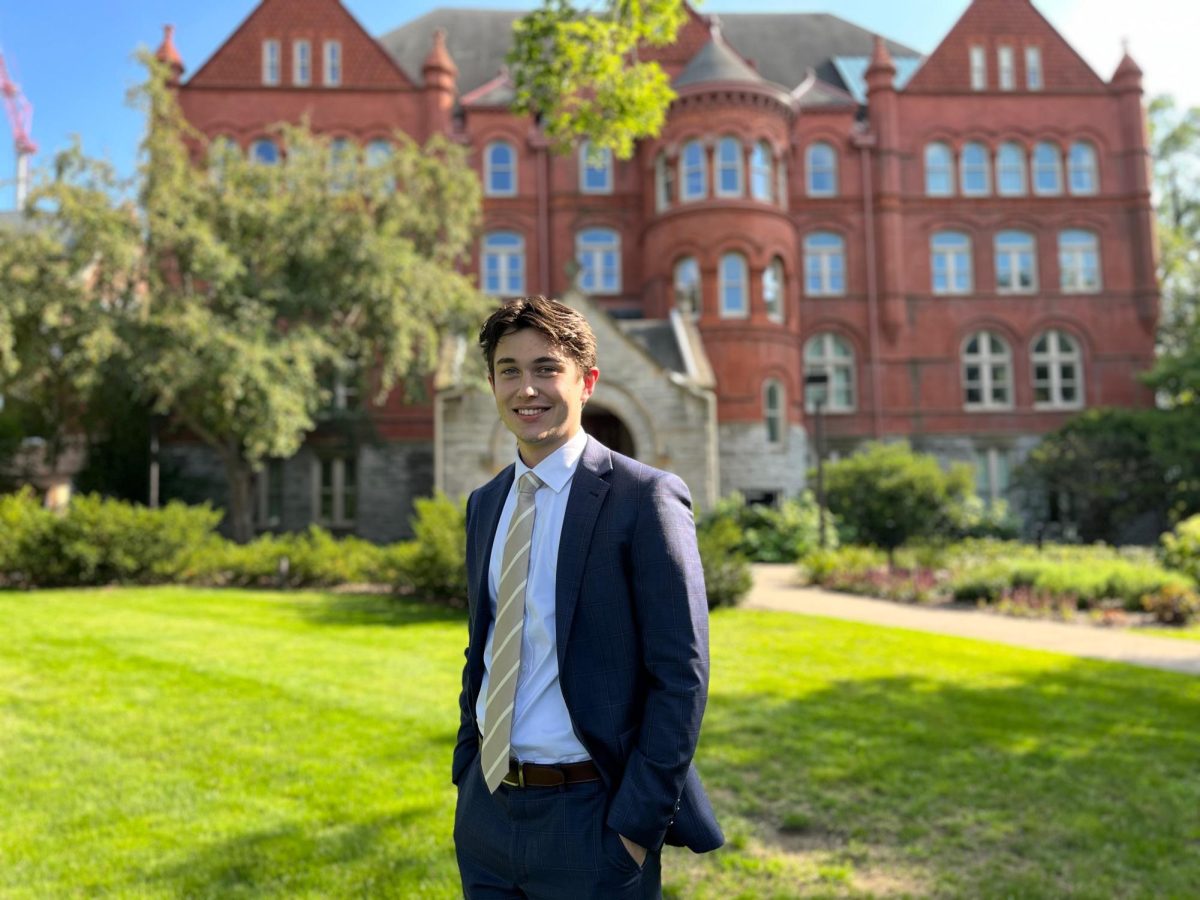When Jeff Garcia ’14 arrived at Macalester as a first-year in the fall of 2010, he was unimpressed with the political culture he found.
“Coming in as a lower middle class, working class guy from New York, it was definitely a culture shock,” Garcia said. “[Macalester] felt kind of turgid in the classroom and in the general way that students – especially older students at the time – talked politics.”
“It didn’t feel collegial,” he continued. “Maybe I had a weird vision of what elite liberal arts looked like, but it was this really striking feeling of – not even if you’re a crazy Richard Spencer type, even if you were a moderate Marco Rubio type – you were going to be pushed out of most groups, most discussions.”
Garcia wanted to put his thoughts into writing. The result was an article titled “Bias at Macalester College,” which – after being heavily edited by noted libertarian scholar George Leef – ran on the website of the Pope Center for Higher Education.
The piece didn’t pull any punches. It accused Macalester’s “academic bias” of “cheat[ing] students out of a more substantial understanding of the world,” and “lead[ing] to bad behavior from professors.”
Garcia doesn’t look back on the piece particularly fondly, but he understands clearly why he wrote it. “You could tell [the school] had been set in its ways for a while,” he said. “No one really felt a need for those kinds of interactions.”
It was a perceptive take for an incoming freshman. Macalester’s tradition as a liberal bulwark in Minnesota is longstanding. Hubert Humphrey taught Walter Mondale here in 1949, and the Mondale name is on buildings across campus.
But while the school has always been connected to and associated with liberalism and the DFL in Minnesota, its students have not always skewed so far left.
Richard Nixon, running for president against John F. Kennedy, was warmly received when he spoke at the college’s old fieldhouse in September 1960. Despite his narrow loss in Minnesota that November, Nixon won 618 votes from Mac students to Kennedy’s 218.
Barry Goldwater – a staunch opponent of desegregation and the Civil Rights Act – received a similarly warm reception when he campaigned at Macalester during his presidential run in 1964.
In those days, Macalester had a prominant Republican population. But the tide began to turn with the outbreak of the Vietnam War. The war was extremely unpopular at the college, as it was with college students across the country, and Mac students were prominent and consistent protesters during the late 60s and especially the early 70s.
A display of newspaper clippings and campaign buttons on the newly-renovated second floor of the library is dedicated to their activism – while many of those earlier graduates commented on Garcia’s article the that they now refuse to donate to the college.
After that, Macalester began to gain its national reputation for liberal and social justice-oriented activism.
Since the mid-2000s, conservative speakers on campus have been hard to come across. Student activity fee dollars have, in recent years, gone to booking civil rights activists such as Shaun King and Angela Davis, while Democratic and Green Party candidates often campaign at the school.
It’s not just conservative or independent students and alums who like to see more diversity of thought. “Last spring there was a panel of about 40 graduating seniors and alumni about the experience at Macalester,” school president Brian Rosenberg told The Mac Weekly in 2011, “many of whom I’m sure would describe themselves as liberal Democrats – said that they wished there were more conservative thought on campus.”
In January, The Washington Post reported that the number of college professors who describe themselves as liberal jumped eighteen percentage points nationally from 1990 to 2014. There are currently five times as many self-described liberals as self-described conservatives in the academy.
Macalester’s faculty, unsurprisingly, leans left as well. Last spring, nearly 50 of the college’s faculty and staff were members of the Facebook group Indivisible St. Paul – a political action group formed to resist the Trump presidency.
Rosenberg himself, though not a member of that group, has been far from shy about expressing his own political beliefs during his now-15-year tenure as the school’s president.
Rosenberg sharply criticized President Trump’s decision to end DACA earlier this year, and has, over the years, in columns for both the Huffington Post and The Chronicle of Higher Education, taken aim at the likes of President Trump, Rick Santorum, Betsy DeVos, and Grover Norquist.
Rosenberg said that he has felt particularly compelled in the last several years to write publicly as several longstanding tenets of the college’s mission – namely multiculturalism and internationalism – have become politically charged.
“It’s one of the reasons why some of the things I have written have taken on a more political slant than they would have in years past, because there is no way to articulate and defend the mission of the institution without diving somehow into politics,” Rosenberg said.
“Those things have become political, but I just see them as the values of the institution.”
But whether the college’s mission is political or not, the college’s curriculum seems to reflect a certain political tradition that excludes conservatism.
“Except for in economics, you didn’t see a lot of Hyatt, Oakeshott, Edmund Burke – and these are important thinkers in the evolution of the modern state and modern politics,” Garcia said. “Despise them as you might, they have to be included. You have to know why people would argue against these [liberal] policies, the different ways people have of looking at the world.”
“These thinkers who lean left, or lean anarchist, are not the only thinkers who are influencing people,” he continued.
There is a danger, Garcia argues, inherent in creating an environment where certain viewpoints are silenced.
“When [speech] becomes codified – when people get harassed on Facebook, or on Twitter – for saying something out of ignorance, it drives it underground, people get resentful, and people get radicalized,” Garcia said. “Especially young white men.”
Rosenberg echoed that point. “I would say it’s not so much that I have a concern about a lack of conservative thought,” he said. “I sometimes have a concern about the lack of willingness to listen with respect to views that are different than your own.”
Rosenberg said he sympathized with the feelings of students who have stopped certain conservative or nationalist figures from speaking at places like the University of California at Berkley and Middlebury College, but he called their tactics “ineffective.”
“You always have to remember when you shout somebody down or shut somebody down that someone can turn around and do it to you,” Rosenberg said. “If you accept that the tactic is legitimate, it’s just as legitimate for someone to turn around and do it to you – and then where do we end up, with nobody being able to speak.”
Administrators and professors have to try to strike a balance between prioritizing the safety of their students and pushing those students outside of their intellectual comfort zones.
“Mac can do what it has to do – to keep itself safe, to keep its community safe, and to carry out its mission – but a lot of it falls on the individual students and professors to say, ‘we’re talking about this, we agree on this, here’s another way of looking at it,’” Garcia said.
One professor who has done just that in recent years is Andrew Latham of political science. In 2013, Latham began offering a course called Conservative Political Thought to fill what he felt was a hole in the college’s curriculum.
“My view is that we are educating students here at Macalester not so that they can thrive and flourish in the Macalester bubble forever, but so they can understand American politics,” Latham said. “Not everyone thinks like Macalester.”
“It’s not about changing minds,” he continued. “I think what I really wanted to accomplish was to allow students to recognize the humanity on the other side. They’re not idiots, or deplorables, on the conservative side. The traditions of liberalism and conservatism are subject to all kinds of criticisms and analysis, but they are viable political traditions.”
When Latham first offered the class, he cross-listed it with philosophy in an attempt to drum up interest. “I thought maybe I’d get 12 students, that it’d be a light semester for me,” he said. “It didn’t work out that way.”
Interest in the class, which is now expanded to Liberal and Conservative Thought, was high from the beginning.
“It’s over-full every time,” Latham said. “It’s one of my favorite classes, and it pleases me that students are genuinely curious about another way of thinking about politics.”
Students have acted as well. Last winter, Jed Buchholz ’19 and Cody Olsen ’18 resurrected Mac GOP – the campus Republican group that had been dormant for four years. “We thought it was a good time to have open dialogue because they felt like they weren’t welcome as much to speak with a conservative viewpoint,” Buchholz said.
The venture has, in his opinion, gone well. “We [campus conservatives] feel like there is a lot more dialogue now,” he said. “I think it actually changed a lot of our minds, because before we thought that we weren’t welcome on campus, but now we can see that that isn’t the case.”
The problem is that traditional conservative thought has been eclipsed in recent years by an increasingly mainstream white nationalist movement.
“We were able to do some decent events, and get people out to them who didn’t necessarily agree with the speakers,” Garcia said. “That was the debate we were having back in 2012 and 2013. Unfortunately, it’s mutated into this thing where you have people like Ann Coulter and Richard Spencer being lionized as free speech paragons. They’re not. They’re white supremacists.”
On that point, all parties seem to be in agreement.
“The last thing we want is someone like Milo Yiannopoulos, who is inflammatory,” Buchholz said. “Our goal isn’t to make people angry or provoke riots, we just want someone to present a different point of view.”
Mac Dems co-chair Taylor Durbin ’19 was of a similar mind. “I would love to co-sponsor an event with a conservative and a liberal,” he said. “I don’t see any reason to invite a provocative speaker like Milo Yiannopoulos or Ann Coulter, because that just seems like a waste of time. But having a reasonable conservative and a reasonable liberal talking would be ideal.”
Rosenberg said that he would be open to sponsoring an event or panel discussion with conservative scholars. Buchholz floated the name of former Breitbart editor Ben Shapiro as a possible speaker.
Shapiro, despite his former position and current one as a conservative agitator, does not support Mr. Trump. Durbin drew a similar line.
“I think there’s certainly a difference between conservative views and Trump views. I have a lot of Republican friends. I don’t have any friends who support Donald Trump,” Durbin said.
Overall, there seems to be a level of congeniality and genuine curiosity in Macalester’s political discourse – however limited it might be – that runs counter to the narrative of hostility and conflict on other college campuses.
“Things are not as bad as they seem to be at some other places across the country,” Latham said. “There is space for, and interest in, a course like Conservative Political Thought. And I think that says something very good and positive about Macalester.”






Peter Graham • Sep 7, 2019 at 5:15 pm
Hi there dear, me and my mother are as well watch funny movies except after I completed my homework
EllBola • May 31, 2019 at 9:35 am
Generico Levitra Online Italia Astromenda Healthy Man Viagra Sales [url=http://drugsor.com]achat levitra au usa[/url] Abilify Cost Per Month Acheter cialis 5mg ligne